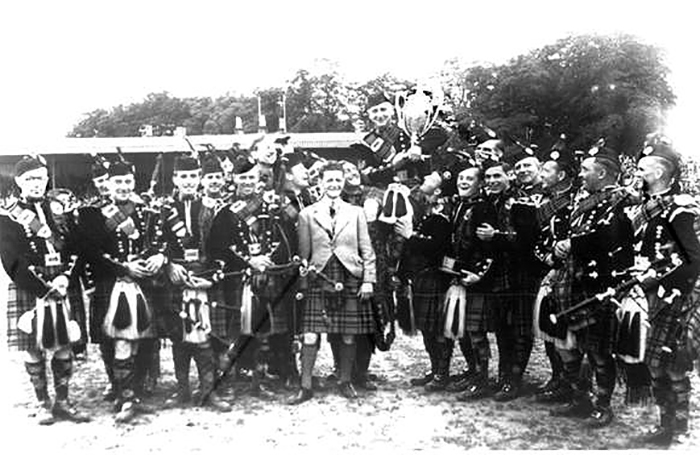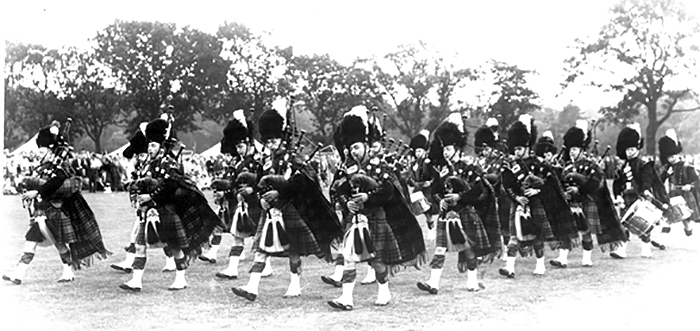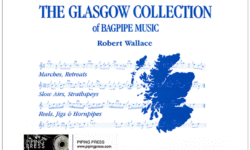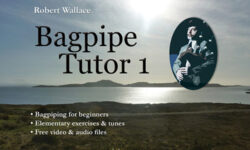
Some of the concerns over ensemble, drumming prizes, tempos and judges in tents, have of course been remedied over the years since the 1950s.
Adjudicators of RSPBA pipe band competitions for many years have no longer been hidden in tents (although that has generated new concerns regarding whether they should be static or move around the competing bands; and whether they should be allowed to share tents and confer with their colleagues).

By Alistair Aitken OBE
Pipe bands also are now judged for M&D [Marching and Discipline] separately during competition performances, although some of the concerns of those writing in the 1950s might still be around – very few bands now have a full No. 1 uniform and standards of dress and deportment still vary. Some of the other issues debated, however, emerge from time to time:
Musical Impact of Drumming
There is no doubt that pipe band drumming has progressed dramatically in a musical sense since the 1950s, but there are still people who consider the drumming to be too technical, over-difficult or imbalanced with the pipers; and some who think that the primary aim of many drummers is to win the drumming prize in all grades. From time to time there have been calls for the drumming prize to be abandoned but so far this has continued to be resisted by the players and the RSPBA. It has often also been questioned why there is a drumming prize when there is not a similar one for the best pipe corps.
[wds id=”2″]
Drumming Adjudicators
Concerns about anomalies in adjudication are just as prevalent today as they were in the 1950s, including claims that drumming adjudicators still tend to comment primarily on technical matters. During my time as an RSPBA adjudicator many attempts were made during adjudicator training courses and development sessions to encourage drumming and piping adjudicators to assess their discipline in a ‘pipe band’ context rather than in isolation (the same argument used by Pipe Major William Sloan for drummers).
Read the original articles here:
Among the reasons we put forward were that the piping in a pipe band can be affected by the drumming (and vice versa) in terms of aspects such as variations in tempo, integration, phrasing, interpretation, sound etc. It is difficult to assess whether this approach during adjudicator training has proved to be successful in practice.
I think it is safe to say that the critique sheets of drumming and piping adjudicators still in the main probably naturally concentrate on technical issues as time to write very detailed comments is very limited; so musical aspects could be being considered primarily in the minds of the adjudicators as each performance progresses.
At the Worlds 2010 -2019 … ‘Only on one occasion did all four adjudicators have the winning band first…..
Detailed scrutiny of competition results is also inconclusive. For example, taking a snapshot look at the results of the Finals of the Grade 1 World Championships (MSR and Medley) over the 10 years between 2010 and 2019 (i.e. 20 separate competitions), the Drumming adjudicator placed the winning pipe band first on only five occasions.

On only seven occasions did the Ensemble adjudicator who was a drummer have the winning band first. On the other hand only seven Ensemble adjudicators who were pipers had the winning band first. Only on one occasion did all four adjudicators have the winning band first. A variety of conclusions could be reached from these statistics but there is scope for debate that a strong focus on technical aspects still exists.
Another factor worth mentioning is that there appears to be an expectation among many players and spectators in the pipe band community that all four adjudicators at Major Championships should achieve the same or similar results. In practice, if the adjudicators are doing their job properly, that is highly unlikely to be possible when there are the three separate disciplines of adjudicator (i.e. Piping, Drumming and Ensemble). They are each expected to be assessing different aspects specific to their respective disciplines, albeit ideally in a collective ‘pipe band’ context.
Next: Pipe Band Ensemble. Read Part 1 of this article here.


















To be clear – I think Alister writes thoughtful and insightful articles
But I do wonder about the conclusions drawn from the analysis of judging at the Worlds
It seems to me to be clear that there is little coherence in the outcomes that have been analysed.
So either the judges are not well aligned in what represents “superior” performance…
… or perhaps the whole approach to judging at the Grade 1 level; where we should surely be able to take technical competence as a “given” is not relevant?
A difficult issue